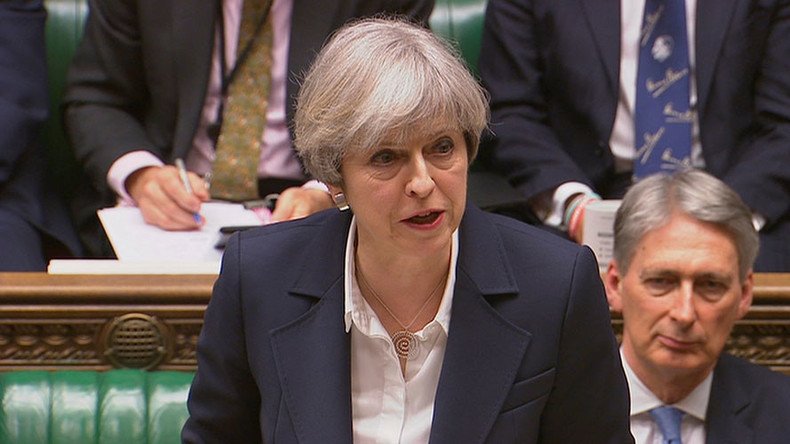'Europhiles may punish Britain over Brexit as warning to other EU states'

The EU cannot really afford some kind of trade war over Brexit that could knock a few percentage points off the medium-term growth rate, Richard Wellings, Research Director, Institute of Economic Affairs, told RT.
British Prime Minister Theresa May has announced that Article 50 of the European Union Treaty has come into force. The Brexit letter signed by May has been delivered to Brussels, setting the wheels in motion.
RT: The EU president says the divorce won't be easy. Is there a chance that Britain will just walk away from the talks?
Richard Wellings: I don’t think so. There is a danger that some of the diehard europhiles in the European Commission and the European Parliament will try to play hardball to punish Britain to try to deter other countries that might be thinking about leaving. But I think common sense will prevail, particularly because a lot of powerful special interests - particularly groups like German industry - will pressurize their politicians. And they’ll say we need to get a pretty good deal because we rely on the UK for a huge proportion of our exports. I do think we will avoid a trade war; we will avoid some of these disastrous scenarios, hopefully at least.
.@theresa_may's invoked Article 50 kicking off #Brexit procedure & will notify @HouseofCommons after #PMQs.https://t.co/58MPvcbZlw
— RT UK (@RTUKnews) March 29, 2017
RT: How strong is Britain going into these negotiations? Does it have the upper hand?
RW: I wouldn’t describe it as the upper hand, but I would say that given how weak the European economies are at the moment – particularly looking at some of these potential crises, for example, with the Italian banking system, I don’t think the EU can really afford some kind of trade war that could knock a few percentage points off the medium-term growth rate, potentially. So this could be disastrous for the EU economy, which is already in a lot of trouble. I think common sense will prevail and there will be some kind of decent deal for both sides.
RT: May says the UK will have to trade on World Trade Organization terms when it leaves the bloc. Do you think that will work?
RW: I think it would work, but I think better still the UK could adopt the policy of unilateral free trade, which is what they do in Hong Kong and Singapore. The UK would have zero tariffs on imports, that means instead of being forced to buy expensive products from the EU, the UK consumers could buy cheap goods from across the world. It will be hugely beneficial for the UK economy and particularly for low-income households that have to pay a fortune for over-priced EU goods, particularly food.
.@theresa_may's been called "shameful, hostile and dangerous"https://t.co/IYXxYh5slA
— RT UK (@RTUKnews) January 18, 2017
RT: Do you think there is going to be a domino effect after this across Europe?
RW: I think it’s a lot more difficult for most of the other EU countries to leave, just because their economies are far more interconnected with other EU countries than the UK. Given its imperial past and because it is an island, I think the UK has a much bigger share of its trade with the rest of the world. Potentially in the long term, Ireland is in the position where it could leave, but for historical reasons, it probably wouldn’t want to, at least in the next few years.
RT: Donald Tusk said that Brexit made the 27 EU members more determined and more united than before. How much do you think he’s going to give in? How much role is he going to have in these negotiations?
RW: EU officials will, if you like, be figureheads, but the real power rests in the hands of some of the big governments – particularly the governments of Germany, France, Italy and so on, particularly the German government, of course, because that is the huge contributor to the EU budgets. That is where the real power lies. Because the German government is very heavily influenced by German exporters, they would have looked at the Russians sanctions, how that hugely damaged the German economy. And it will go on to repeat on a much larger scale with the UK. I think there will be a move toward getting a pretty good trade deal – perhaps transitional arrangements for few years with zero tariffs and then moving on to longer-term arrangements along those lines.
The statements, views and opinions expressed in this column are solely those of the author and do not necessarily represent those of RT.












